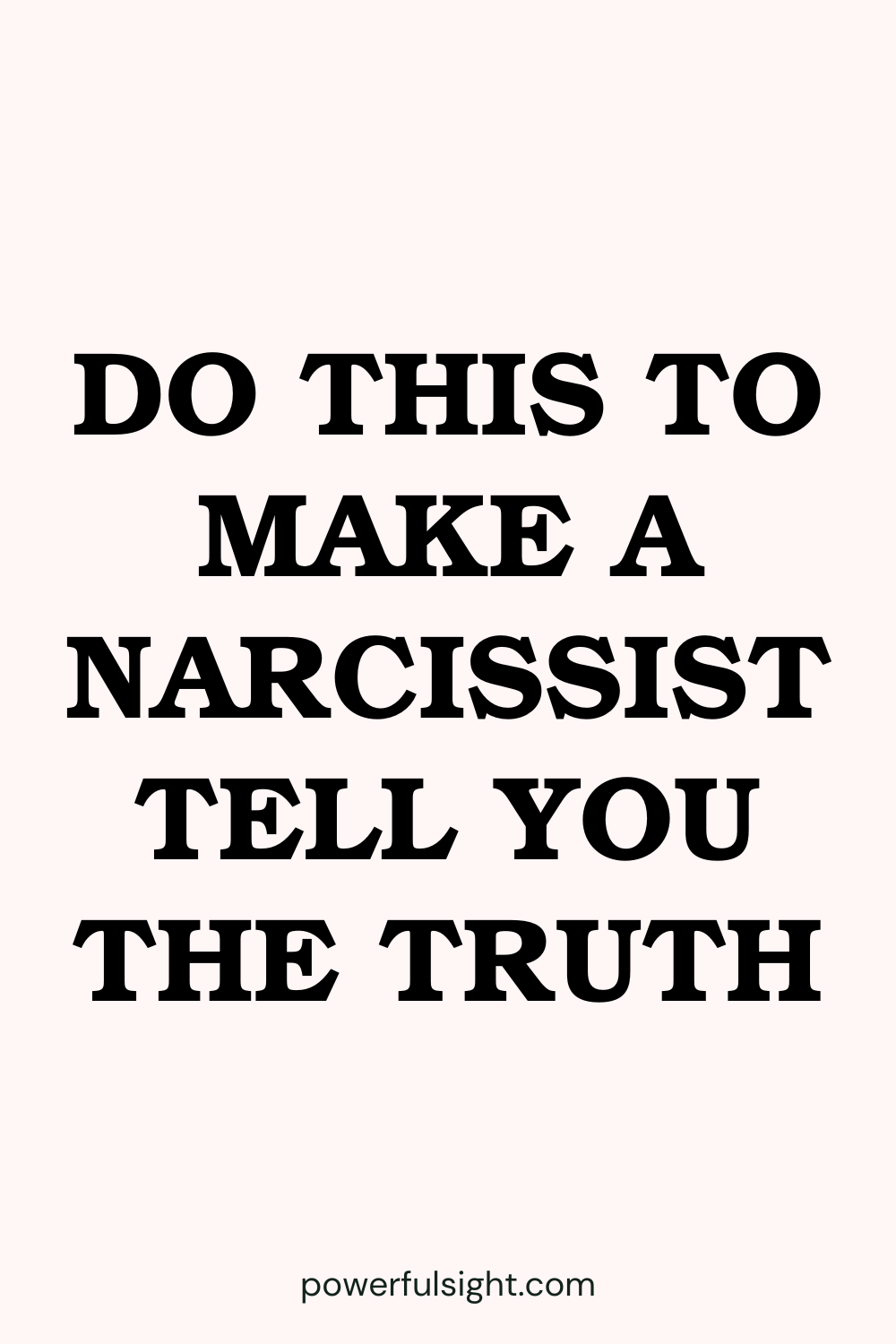If you’ve been around narcissists, then you don’t need me to tell you just how difficult they can be to pin down with the truth.
Narcissists lie, bend facts, gaslight, manipulate, and obscure details to maintain control, protect their image, and preserve their egos. From intimate partners to parents, coworkers to friends, trying to get a narcissist to tell the truth is often an exercise in frustration, bewilderment, and powerlessness.
The reality is that narcissists simply don’t tell the truth the way most people do. They survive on a diet of lies, half-truths, distortions, obfuscation, gaslighting, and other tactics that protect them from getting hurt and from being held accountable.
While you may never get total honesty from them, there are ways to trick them into revealing the truth and to call their bluff.

Why Do Narcissists Lie?
First, you need to understand the mindset of a narcissist when it comes to truth. Narcissists do not value honesty in the way most people do, because they have no foundation on which to base a truthful perspective. For them, any nugget of objective truth is a potential knife to their ego and their constructed reality. Their entire identity rests on denial.
Here are some of the main reasons narcissists lie and avoid the truth:
-
Ego protection – They cannot admit mistakes without feeling weak or vulnerable. If they lie about making a mistake, it didn’t happen.
-
Control – They believe the world revolves around them and must maintain control, often through lies.
-
Lack of accountability – They see themselves as victims, not as responsible parties. Lying protects them from blame.
-
Fantasy self – They fabricate an idealized version of themselves and lie to uphold it.
-
Manipulation – Lies become tools to play with your emotions—guilt, fear, dependency, and confusion.
Once you understand that their dishonesty is a survival mechanism, you stop expecting honesty and begin focusing on the bigger picture of their behavior patterns.
Related; 7 Things Narcissists Don’t Want You To Know
Tactics Narcissists Use to Lie
If you want to expose a narcissist’s lies, you must first recognize the tactics they use most often:
-
Gaslighting – Denying facts or situations to make you doubt yourself.
-
Deflection – Dodging questions by changing the subject.
-
Projection – Accusing you of the very things they are doing.
-
Half-truths – Mixing truth with lies to confuse you.
-
Victim playing – Pretending to be wronged or persecuted.
-
Over-explaining – Offering long, exaggerated responses instead of a straight answer.
Spotting these tactics is the first step in calling their bluff and resisting their games.
Can You Make a Narcissist Tell the Truth?
The hard truth is: no, you can’t force a narcissist to be honest—at least not immediately. They are too entrenched in their own delusions to suddenly give you a genuine answer.
But here’s the good news: you don’t need to make them. Instead, you can:
-
Ask questions that are harder to lie about.
-
Use facts and evidence to support your claims.
-
Pay attention to what isn’t being said.
-
Interpret the subtext of their answers.
The truth doesn’t have to come from them—you can uncover it yourself without relying on them to change.
Related: How To Live With A Narcissist
Strategies to Expose the Truth
With practice and patience, you can use these approaches to reveal inconsistencies and get closer to the truth:
-
Stay calm and neutral – Don’t accuse or confront with anger, or they’ll go on the defensive.
-
Ask direct, simple questions – Closed-ended questions like “Did you do this?” limit wiggle room.
-
Use silent pauses – Don’t rush to fill silence; it often prompts mistakes or slips.
-
Look for patterns – Inconsistencies across time expose lies.
-
Appeal to their ego – Frame questions in a way that pressures them to appear honest.
-
Use outside evidence – Present proof when necessary, but keep some information to yourself.
-
Avoid revealing what you know – Don’t let them tailor lies to fit your knowledge.
-
Watch body language – Hesitations, avoiding eye contact, or overexplaining are red flags.
-
Separate facts from emotions – Ground yourself in reality; write things down if needed.
Finally, accept that sometimes you won’t get the truth—and that’s okay. In serious cases, outside help, legal steps, or documentation may be required.
Related: How to Protect Yourself from a Narcissistic Mother
Protecting Yourself From Narcissistic Lies
Protecting your mental health matters as much as uncovering the truth. Keep these in mind:
-
Journal – Document conversations and events; patterns emerge over time.
-
Talk to friends – Trusted outsiders can spot what you may miss.
-
Set boundaries – Limit contact if lying becomes abusive.
-
Choose peace – Let go of lies that don’t truly matter.
Related: How To Handle A Narcissistic Partner
Healing From Narcissistic Lies
Long-term exposure to lies can leave deep scars—feelings of betrayal, self-doubt, and broken trust. Healing is possible with time:
-
Validate your experience – Acknowledge that the lies happened.
-
Rebuild trust in yourself – Make small choices and honor them.
-
Seek professional help – Therapy can provide guidance and healing.
-
Rediscover your identity – Reconnect with passions, friends, and goals beyond the narcissist.
Closing Thoughts
Trying to get a narcissist to tell the truth can be maddening and exhausting. But it is possible to cut through their lies by recognizing their tactics, calling out inconsistencies, and staying grounded in your own reality.
The most important truth is the one you tell yourself.
Don’t let a narcissist’s lies define you. Trust your instincts, honor your experiences, and protect your peace.
Save the pin for later

- 9 Things Daughters Of Narcissistic Mothers Don’t Do - 02/03/2026
- Daughters of Narcissistic Mothers Healing Affirmations - 27/02/2026
- 5 Perfect Mother’s Day Gift Ideas (That She’ll Truly Love) - 27/02/2026
